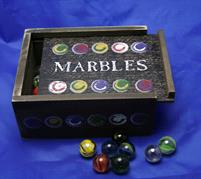Today I would like to go back in time with you to the Stone Age…Ok maybe not that far. Let’s say right before the advent of computers. Back to the paper forms era; when all your company’s information was kept in big file drawers. To check the stores’ sales, you had to take out all the entries from the drawer and then analyse them.
It was just like opening a box full of marbles and counting them one by one.
The margin for error was high and it took a lot of time to calculate and analyse the data. Back then the term business intelligence (BI) didn`t exist.
Nowadays it`s hard to believe a company could operate this way. They all now have databases: computerized data warehouses assuring a fast and continuous access to all the data of the company.
But a database alone won’t give you the advantage over other companies. It will allow you to easily store your data; but to benefit from it you have to know how to process this data. A simple report including the sales for each store sorted by months is an excellent start.
We now have a high speed robot to count the marbles in the box.
Subsequently, new analyses and new perspectives for existing ones can be added. They will develop your BI system; but they also mean an increasing quantity of data to process. When this quantity is too important, performance issues are likely to arise.
We’ve reached the limit; the robot has too many marbles to count…
What if I told you that you didn’t reach the limit; all you need is another technique?!
There are databases made especially for BI: they`re called data cubes. Data cubes will pre-calculate data instead of processing it upon a user request to avoid redundancy. The processor such a task usually will take place at a time the users don’t need the system.
The robot will pre-count all the marbles of all the boxes during the night and write the total on every box.
The result: a report that previously took 1 minute to process now takes 2 seconds. All you needed was the right technique!
What’s the next challenge??


